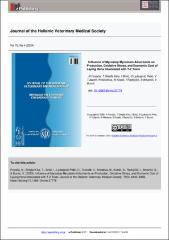| dc.contributor.author | Puvača, Nikola | |
| dc.contributor.author | Shtylla Kika, T. | |
| dc.contributor.author | Brkić, I. | |
| dc.contributor.author | Ljubojević Pelić, Dragana | |
| dc.contributor.author | Tufarelli, V. | |
| dc.contributor.author | Nikolova, N. | |
| dc.contributor.author | Kostić, B. | |
| dc.contributor.author | Radojičić, I. | |
| dc.contributor.author | Brkanlić, S. | |
| dc.contributor.author | Bursić, V. | |
| dc.date.accessioned | 2025-02-18T09:16:31Z | |
| dc.date.available | 2025-02-18T09:16:31Z | |
| dc.date.issued | 2024 | |
| dc.identifier.citation | Puvača, N., Shtylla Kika, T., Brkić, I., Ljubojević Pelić, D., Tufarelli, V., Nikolova, N., Kostić, B., Radojičić, I., Brkanlić, S., & Bursić, V. (2025). Influence of Mycostop Mycotoxin Adsorbents on Production, Oxidative Stress, and Economic Cost of Laying Hens Intoxicated with T-2 Toxin. Journal of the Hellenic Veterinary Medical Society, 75(4), 8445–8456. https://doi.org/10.12681/jhvms.37778 | en_US |
| dc.identifier.issn | 1792-2720 | |
| dc.identifier.uri | https://repo.niv.ns.ac.rs/xmlui/handle/123456789/930 | |
| dc.description.abstract | Mycotoxin contamination in poultry feed poses a significant threat to both production performance and
animal health. Among various mycotoxins, the T-2 toxin stands out as particularly detrimental to laying hens, leading
to decreased productivity and increased oxidative stress. This study aimed to evaluate the efficacy of two mycotoxin
adsorbents, Mycostop Premium 2.0 and Mycostop Supreme, at a concentration of 2 kg/t of feed, in mitigating the adverse
effects of T-2 toxin on laying hens’ production performance, nutritive and physical egg quality, oxidative stress
levels, the occurrence of oral and tongue lesions, and economic cost of production. A total of 200 laying hens were
randomly allocated to four dietary treatments: control T1 (basal diet without T-2 toxin or mycotoxin adsorbents), T2
(basal diet contaminated with 8 mg/kg of T-2 toxin), T3 (basal diet contaminated with 8 mg/kg of T-2 toxin and 2kg/t of
feed Mycostop Premium 2.0), and T4 (basal diet contaminated with 8 mg/kg of T-2 toxin and 2 kg/t of feed Mycostop
Supreme). The trial lasted for 56 days, during which production performance parameters, including feed intake, egg
production, egg weight, and feed conversion ratio, were monitored. Additionally, nutritive and physical egg quality
traits, such as shell strength, yolk color, albumen height, and Haugh unit, were assessed. Oxidative stress biomarkers,
including malondialdehyde (MDA) levels were measured to evaluate the impact of mycotoxin adsorbents on oxidative
stress levels in laying hens. Furthermore, the occurrence and severity of oral and tongue lesions were recorded to
assess the potential protective effects of Mycostop Premium 2.0 and Mycostop Supreme against mycotoxin-induced
oral health complications. In conclusion, findings of this research highlight the potential of mycotoxin adsorbents as
valuable tools for safeguarding poultry health and optimizing productivity in mycotoxin-challenged environments | en_US |
| dc.description.sponsorship | This research was funded by the Ministry of Education, Science, and Technological Development of the Republic of Serbia. | en_US |
| dc.language.iso | en | en_US |
| dc.source | Journal of the Hellenic Veterinary Medical Society | en_US |
| dc.subject | hens | en_US |
| dc.subject | table eggs | en_US |
| dc.subject | mycotoxins | en_US |
| dc.subject | T-2 | en_US |
| dc.subject | stress | en_US |
| dc.subject | adsorbent | en_US |
| dc.subject | nutrition | en_US |
| dc.subject | poultry | en_US |
| dc.title | Influence of Mycostop Mycotoxin Adsorbents on Production, Oxidative Stress, and Economic Cost of Laying Hens Intoxicated with T-2 Toxin | en_US |
| dc.type | Article | en_US |
| dc.identifier.doi | 10.12681/jhvms.37778 | |
| dc.citation.volume | 75 | en_US |
| dc.citation.issue | 4 | en_US |
| dc.citation.spage | 8445 | en_US |
| dc.citation.epage | 8456 | en_US |
| dc.citation.rank | M23 | en_US |
| dc.type.version | published | en_US |

